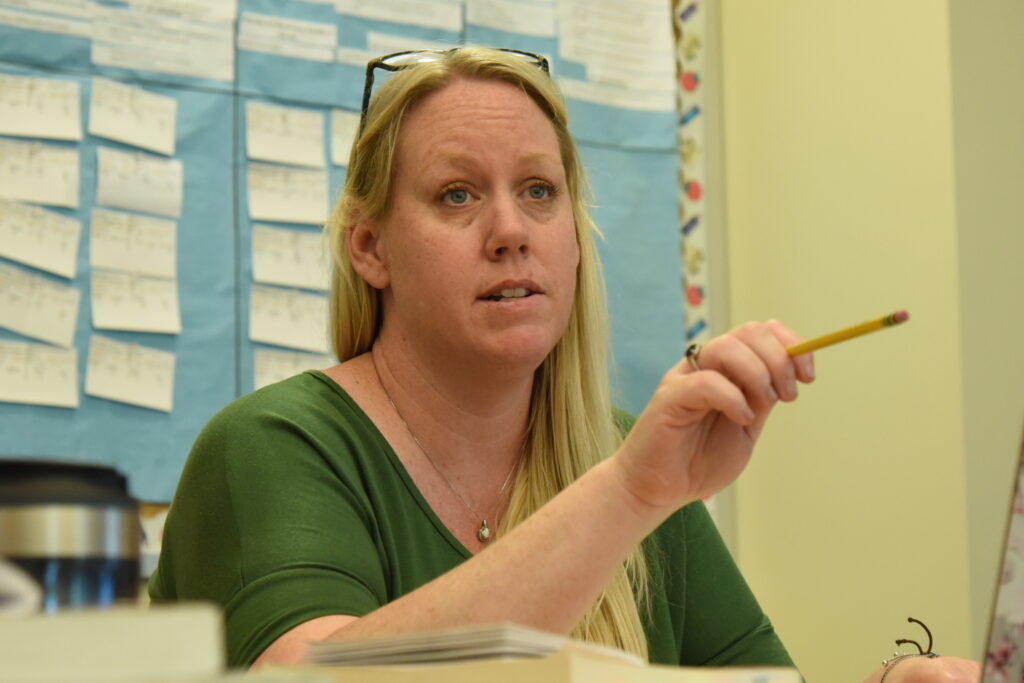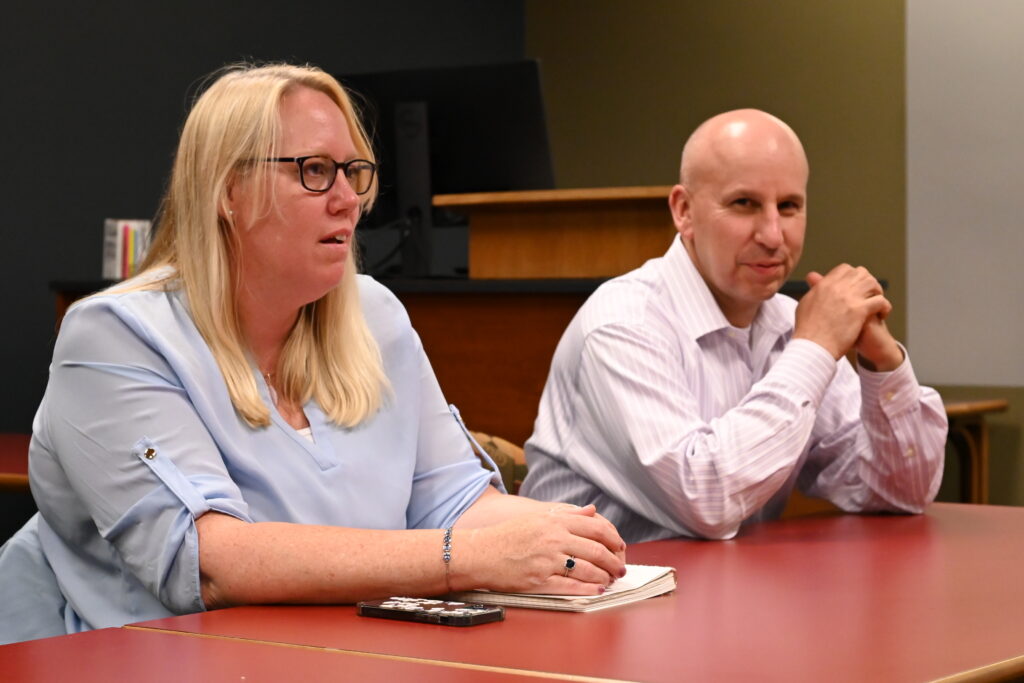Inspiring Higher Aspirations
February 21, 2023

Jody Glass helps students see around the obstacles that constrict their vision of who they can become. She’s in her sixth year of teaching, a second career for her, after spending a decade as a youth minister. While a minister, Jody realized, “I see these kids once, maybe twice a week. They’re at school all day.” To really help them, “I need to be in the schools!” At age 34, she went back to school to earn a dual degree in history and secondary social studies education. She chose social studies in order to help students “function in society” —and because “I love history,” she said. In 2021, Jodie began Ashbrook’s Master of Arts in American History and Government (MAHG) program to help her teach students to see themselves as full participants in our constitutional system. It has transformed her life as a teacher and the lives of her students.
While she began her teaching career at an affluent private school, she now teaches at Anderson County High School in Clinton, Tennessee, a rural town northwest of Knoxville. For the young men at the school, “it’s an accomplishment to graduate high school…. College is not expected.” For young women, marriage is the goal, and it’s an achievement to graduate before bearing children. “We have a daycare in our high school,” Glass said, “and if we can get young mothers to finish school, it’s a big deal.”
Jodie understands these students. She grew up in poverty, in a community where few aspired to attend college. “My husband and I both rose above that. We’re educated. Now,” Glass said, “I want to pour myself into” helping students pursue bigger dreams.
Glass teaches American history and government, including Advanced Placement American History. Unfortunately, Glass’s students are not always ready for a high-level course; they have not yet developed the necessary reading skills.
This doesn’t discourage Glass. Although her students begin at a skills disadvantage, they learn. Glass makes sure they see the progress they make. She gives them a pre-assessment at the beginning of the semester, then gives them the same test at the end. Seeing the score improvement surprises and encourages them. “It’s not about the grades; it’s about what you learn,” she tells students.
Finding the Perfect Classroom in Ashbrook’s Graduate Program
Glass’s teaching approach solidified when she began her studies in Ashbrook’s graduate program in 2021. “I walked into my first class and I thought, ‘Wait, this is an exchanging of ideas! People are reading, then they’re bringing their thoughts about the reading to the table. We are feasting together upon this information. I fell in love with program; it fit into my idea of the classroom perfectly,” Glass said.

Ashbrook graduate students discuss the context and the purpose of each primary document while “dealing with conflicts within the text. You have to dive deep to reach understanding.”
Deep diving is best done in the company of knowledgeable guides and eager fellow learners. Glass is impressed by her Ashbrook professors’ grasp of their subject matter. “You know they enjoy talking about it. It’s like any classroom, right? If you as a teacher get excited about the material, your students will, too, no matter how old they are.”
She also learns from her fellow teachers in the program. Listening to their comments on the readings, Glass often finds herself thinking, “Never in a million years would I have thought of that.” The graduate program, Glass says, is “a free space in which free thinkers enlighten each other.”
Helping Struggling Readers
Glass wanted to bring the primary documents she was studying in her graduate program to her students. At first, this didn’t go as well as she’d hoped, even at her former private school. “The majority of my students didn’t read very well; they definitely couldn’t read primary sources that are intricate, detailed, and dense. . . . They’re used to reading mobile phone texts and emojis,” she mused. She had to figure out “how to take the structure that I know works in the graduate program into my classroom on a day-to-day basis.”
She adopted a “think, pair, share” approach—students read a primary text on their own, thinking about it; then they talk about it with a partner; then each partnered pair shares their observations with the class. To deepen and solidify students’ understanding, she uses Socratic seminars. Her students prepare for these by working through written questions, finding support for their answers in the primary documents they are reading. This helps students cite evidence more fluidly during the later discussion.
Since she began teaching at her current school, where many students are “below-level in reading and writing,” Glass has changed her approach in only one respect: she uses much shorter excerpts of the primary documents she covers. She doesn’t use the “modernized” paraphrases of primary documents that some teachers present to struggling readers. “I don’t like doing that. I want them to read the original language. Otherwise, you lose so much of the meaning. Instead of bringing to the text what you expect to find, “You should pull meaning out of the text.” When students struggle with unfamiliar words, she points them to the dictionary.
Encouraging Questions
Glass also teaches topics in US government. “I love constitutional law,” Glass says, because of the way it circles around the problem of protecting individual rights while making room to improve the community as a whole. Students share her interest in this. Glass recalls a recent lesson on the Gilded Age and progressive attempts to restrain the power of big business. “Ms. Glass,” a student asked, “doesn’t this relate to debates over electric cars today?”
“You’re onto something; I can feel it,” Glass said. “What do you think is the connection?”
“Well, hasn’t the state of California passed a law saying they will fine people if they don’t purchase electric cars by a certain date?” Living in an area where used cars are the norm, the student was incredulous at what he took to be an infringement of individual rights.
Glass explained that California is banning the sale of new cars that are not electric by 2035. But as discussion continued, students wondered if the law had been influenced by lobbyists for the electric car industry.
“They make these connections all the time,” Glass said. “I encourage them to make their voices heard when they don’t like what is happening” in civic life. For Jody Glass, it’s all part of her mission to help students “understand our constitutional system” so that they will know how to engage in it to preserve America’s fundamental principles.

